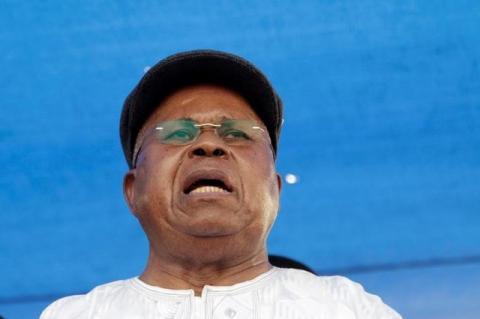Advertisement
Congo's main opposition leader, Etienne Tshisekedi, dies at 84
KINSHASA (Reuters) - Democratic Republic of Congo's veteran opposition leader, Etienne Tshisekedi, has died in Brussels aged 84, his party said on Wednesday.
Tshisekedi stood up to Mobutu Sese Seko, who ruled the country then known as Zaire, for more than three decades before Mobutu was overthrown by Rwanda, Uganda and other forces.
He was also the main civilian opponent of Laurent Kabila, who took power in 1997, and his son, President Joseph Kabila, who has ruled since 2001.
Tshisekedi was set to take the top post in a transitional council agreed in December under a deal to pave the way for Kabila to leave power in 2017 and refrain from running for a third term as president.
His death deprives the opposition of its principal figurehead as talks over implementation of the December accord falter. His son, Felix, is tipped to be named prime minister in a forthcoming power-sharing government.
"The information is confirmed. The (party) president is dead," the spokesman for Tshisekedi's Union for Democracy and Social Progress (UDPS) party, Augustin Kabuya, told Reuters.
A pivotal figure in Congo, whose history has been marked by foreign intervention, civil war, coups and authoritarian rule, Tshisekedi's stalwart activism meant he could draw huge crowds.
His death comes at another inflection point in the country's history following Joseph Kabila's failure to step down when his constitutional mandate expired in December.
Dozens have died since 2015 in anti-government protests over alleged efforts by Kabila to cling to power and international powers fear tensions could spark a resurgence of civil wars that lead to the deaths of millions between 1996 and 2003.
As word of his death spread in the capital Kinshasa, clashes broke out near his house in the Limete district between stone-throwing UDPS supporters and dozens of police, who fired teargas and made several arrests, a Reuters witness said.
Tshisekedi served as a minister under Mobutu before founding the UDPS, the first organized opposition platform in Zaire, in 1982.
He was named prime minister four times in the 1990s as Mobutu contended with pro-democratic currents in the country, but Tshisekedi never lasted more than a few months as he repeatedly clashed with the charismatic autocrat.
He finished runner-up to Kabila in the 2011 presidential election. International observers said the vote was marred by fraud and Tshisekedi's supporters have referred to him ever since as the "elected president".
"A baobab (tree) has fallen," Albert Moleka, his chief of staff during the 2011 election, told Reuters. "The baobab protects you from the rain and the sun ... people like that can't be replaced."
Tshisekedi returned to Congo's capital, Kinshasa, last July to a hero's welcome after two years in Brussels for medical treatment. The UDPS said he returned to Brussels last week for a checkup.
(Additional reporting by Benoit Nyemba and David Lewis in Nairobi; Editing by Andrew Roche and Dominic Evans)



















Add new comment